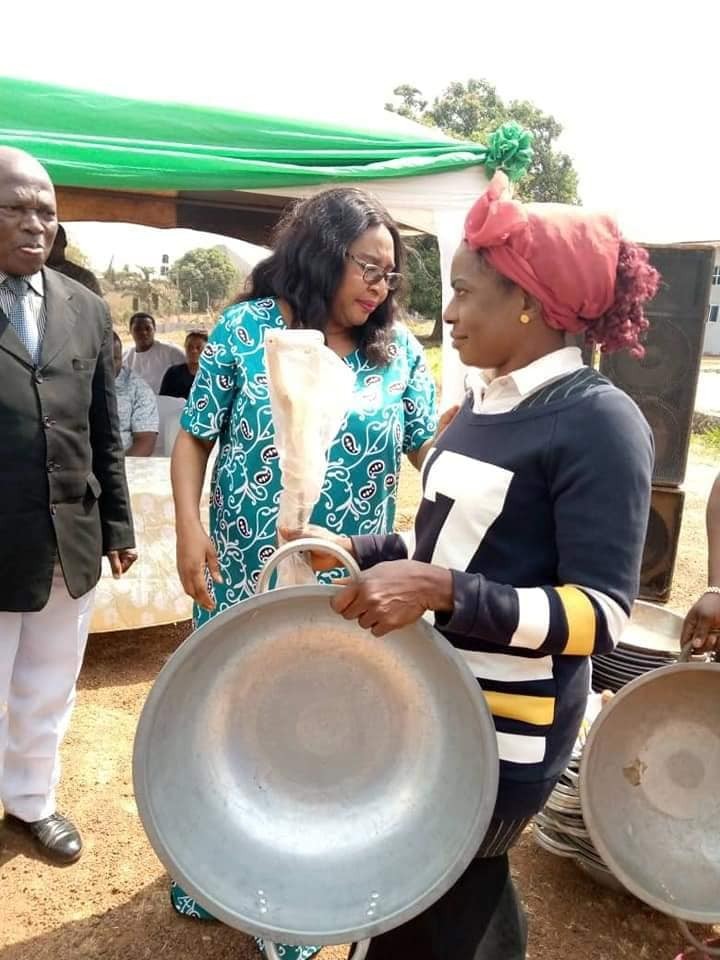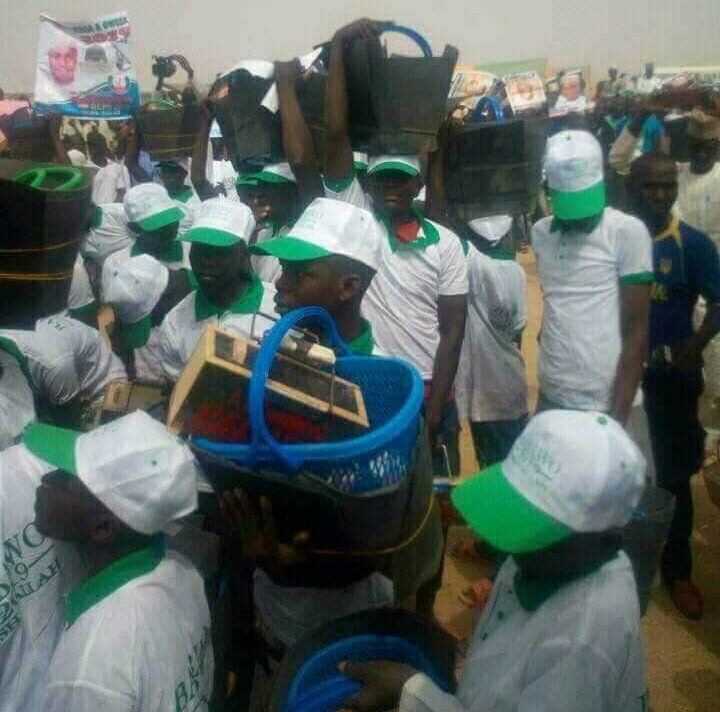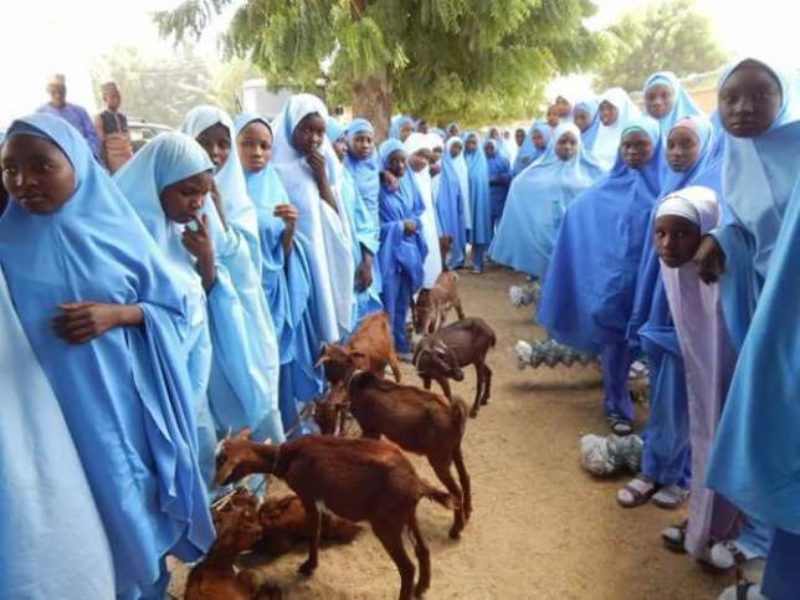The high poverty rate in the country has made it imperative for poverty alleviation programmes to be initiated from time to time by elected and political office holders.
While the thinking behind the gesture is commendable, Nigerians have often had cause to berate leaders for some of the interventions, which they say are primitive, demeaning and not in tandem with modern ways of living.
In spite the outrage some of these empowerment programmes have sparked, the donors insist that they are provided on a needs basis and in response to the demands and peculiarities of the beneficiaries and the environments they find themselves.
The social media space was recently abuzz with condemnations of the member representing Toro Federal Constituency of Bauchi State in the House of Representatives, Umar Muda Lawal, after he disclosed plans to construct wells in some communities in his constituency.
“This time we are going outside the box to construct 10 Deep Wells in 10 rural towns and villages of Toro LGA. Because Traditional Wells are often more reliable and lasts longer than any modern small-scale water supply system.
Most Wells today are centuries old and still working,” he wrote on his Facebook page but this didn’t go down well with many of those who reacted to the development.
Lawal is not the first to provide an intervention considered bizarre. From goats to noodles to head pans, frying pans and donkeys, Nigerians have seen and received all manner of ‘absurd’ items in empowerment programmes.
In 2017, a Lagos lawmaker, Segun Olulade, empowered members of his Epe constituency with headpans, trowels, shovels, fishing nets and hairdressing equipment among others.

In 2020, Nsukka local government caretaker chairman, Chinwe Ugwu empowered women in the local government with head pans, shovels and trowels. She had earlier donated 30 new wheelbarrows to some wheelbarrow pushers, who hitherto hired them to earn a living by conveying people’s goods.
A politician and former House of Assembly contender in Benue State, Daniel Ukpera, in 2020, sparked outrage when he donated brand new nylon ropes to goat rearers in his community to help them tie their goats as his own support for the state’s open grazing prohibition law.
In 2020, wife of Bauchi State governor, Aisha Bala Mohammed, through her charity organisation, Al-Muhibba Foundation, empowered 250 women in Gwana District of Alkaleri local government with items including 50 spaghetti making machines and 1,000 bags of sachet water to support 50 sachet water business owners.

In Borno, the state Commissioner for Higher Education and aspirant for the House of Representatives in 2019, Usman Jaha (Babawo), earned a query from then Governor Kashim Shettima, after he distributed shoe polish and other items to youth in Gwoza as part of his welfare programme.
Shoe polishing is one of the popular menial jobs many unemployed and out-of-school young people especially in the north take to and the donor, in his defence, said the effort was based on the peculiar needs of the beneficiaries in Gwoza.

In 2017, the Kano State Governor Abdullahi Ganduje-led Kano State government spent N208 million to empower 5,200 Masu Shayi (tea sellers) across the 44 local governments in the state.
The distributed items included cartons of noodles, cocoa beverage, liquid and powdered milk, tea, crates of eggs, nylon and cups, baskets, brown and white sugar, spaghetti and bread as well as N40,000 take-off capital.

In 2015, Jigawa State Governor Muhammad Badaru, empowered 8,610 widows in the state with two she-goats and one he-goat each, to help them take care of their children’s feeding and schooling needs.
In 2019, a lawmaker representing Jalingo, Yorro and Zing federal constituency of Taraba state, Maigari Bello-Kasimu donated 14 wheelbarrows to Youth as constituency project.
In 2016, Katsina State Governor Aminu Masari, purchased 3,000 metal coffins at the rate of N40,000 each and distributed them to 3,000 mosques in the state as government support to the religious houses.
The state government also purchased 4,500 goats, in a “goat loan” scheme to empower women across the 316 wards of the state. The scheme was financed with a N2bn loan from the Central Bank of Nigeria. Similarly, secondary school girls in the state were empowered with goats.
In what later became widely known as stomach infrastructure, Ayo Fayose, while he held sway as governor of Ekiti State between 2015 and 2019, from time to time, distributed loaves of bread, live chickens, and items such as rice, milk, vegetable oil, beverages and seasoning to the people.
Former Senator representing Kaduna Central, Shehu Sani, in 2016, distributed transistor radios to his constituency members in 2016.
Senior Special Assistant to Kano State governor on Youth Development, Murtala Gwarmai, in a colourful ceremony at the state’s Ministry of Youth and Sports,distributed donkeys and other items such as roofing sheets and building blocks to empower young people.
The member representing Southern Ijaw Federal Constituency in the House of Representatives, Preye Influence Oseke, also gave out fishing nets and canoes to his constituents.
In 2018, lawmaker in Abia State, Mandela Obasi, empowered his constituents with machetes and hoes while Senator Mao Ohuabunwa, representing Abia north district empowered women in his constituency with frying pans in the same year.
In 2014, during the administration of former President Goodluck Jonathan, the federal government approved the purchase of 750,000 units of clean cooking stove worth N9.2billion under the National Clean Cooking Scheme for distribution to rural women nationwide free. Some of the questions critics asked at the time were “where is the food to cook with the stoves.”
What expert says
A development consultant, Lemmy Ughegbe, described as primitive, the attitude of politicians to leadership and governance.
“To think that in the name of empowerment programmes, you find politicians buying wheel barrows, farming tools like cutlasses, hoes, sinking boreholes and even most recently, digging wells, is most ludicrous. So, a lawmaker who buys 100 wheel barrows for his constituents is saying that his people should all be wheel barrow pushers, while the one that buys hoes and cutlasses wants his people to be all subsistence farmers. We even witnessed the current Senate President sponsor the wedding of over 100 couples in Bauchi with the ridiculous explanation that he was ‘empowering them to start a family.’ Will he provide them with funds in their marriages? This is further “disempowering” them and continuing the vicious cycle of poverty.”
Ughegbe, who is the Founder of Make a Difference Initiative (MAD), averred that in a 21st century that is skills driven, politicians should empower their people by creating Special Skills Acquisition Centres or grant then access to such centreswhile opportunities should be created for those who want formal education to get it.
“There’s no better way to empower a people than giving them access to education or skill acquisition trainings. This is the way a right thinking 21st century politician or leader should think. Sadly, the politician or leader also knows that as the people get education and skills, they acquire the knowledge and guts to question their kind of leadership and seek to change them. This is often the reason politicians and leaders prefer to keep them in servitude through phoney empowerment schemes like the above stated,” he added.









